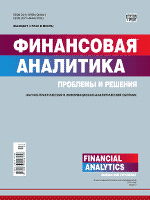Abstracting and IndexingРИНЦReferativny Zhurnal VINITI RAS Worldcat Google Scholar Online availableEastvieweLIBRARY.RU Biblioclub |
Pension, inflation and public-sector debt
Available online: 21 September 2014 Subject Heading: ISSUES ON ECONOMICS JEL Classification: Pages: 13-28
The article considers the issue of financial punitive measures in modern Russia in terms of pension savings, most of which get invested in nominal government bonds and managed by Vnesheconombank, the government-owned management company (GMC). The author uses a traditional research method, which is simplyfied in the sense that a full-fledged testable hypothesis is replaced by a thesis that an erosion of retirement savings' purchaing power is a product of financial punitive measures aimed to reduce the government's domestic debt. A set of information includes official statistics data, as well as the results of 414 government bonds issuances performed within the period of 2003-2013. The analysis of the given information supports that thesis. In modern Russia, we can observe all the conditions and elements of financial punitive measures as they are "prescribed" by the literature. The paper points out that the financial punitive measures mainly harm would-be pensioners, who by default, or knowingly allowed GMC to manage their pension accruels. GMC, whose investment options are severely constrained by "prudential" regulations and the lack of inflation-protected instuments, invests heavily in nominal government bonds issued primarily with negative real yields. Therefore, the GMC' objective recorded in investment declaration (to ensure the long-term growth of pension savings) is not attainable, if this increase is expressed in constant prices. From 2004 onwards, GMC has lost a quarter of the purchaing power due to inflation of its "pension" portfolio, while a group of private investment managers with more ample investment opportunities scored a draw in the fight against inflation. Keywords: pension accruals, financial punitive measures, inflation, public-sector debt References:
|
ISSN 2311-8768 (Online)
|
|








